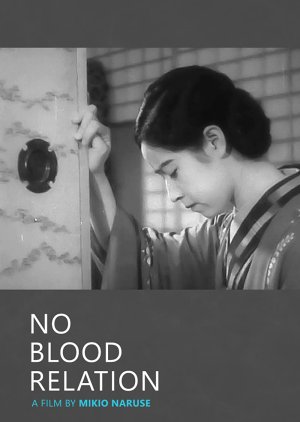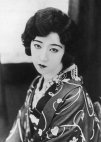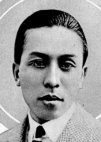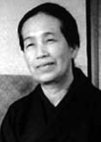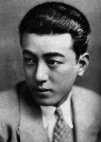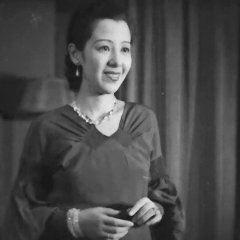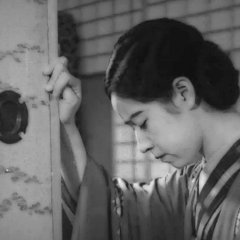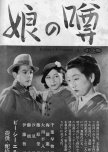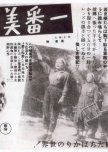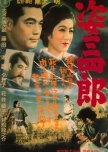An actress returns to Tokyo after a successful stint in Hollywood to reclaim - with the help of her gangster brother - the daughter she abandoned years before. (Source: IMDb) Edit Translation
- English
- magyar / magyar nyelv
- dansk
- Norsk
- Native Title: 生さぬ仲
- Also Known As: The Stepchild , Not Blood Relations , Nasanu Naka , Nasanunaka
- Director: Naruse Mikio
- Screenwriter: Noda Kogo
- Genres: Historical, Life, Drama, Melodrama
Cast & Credits
- Okada YoshikoKiyooka TamaeMain Role
- Tsukuba YukikoAtsumi MasakoMain Role
- Nara ShinyoAtsumi ShunsakuSupport Role
- Oka JojiKusakabe MasayaSupport Role
- Katsuragi FumikoKishiyo [Atsumi's mother]Support Role
- Yuki IchiroMakino KeijiSupport Role
Reviews

What does it mean to be a mother?
No Blood Relation was the second oldest surviving film from director Naruse Mikio. Like Ozu Yasujiro, many of his early films have been lost to the ravages of time. Based on a novel by Yanagawa Shunyo, Naruse asked the question, “What makes a mother?” Is it biology or nurture? A little girl would be torn between the only mother she’d ever known and the mother who came to town to claim her.Famous actress Tamae Kiyooka returns home to Japan after making her fortune in the United States. First on her list of things to do is to regain custody of the daughter she abandoned as a newborn when she ran off with her lover to pursue her career in Hollywood. Coincidentally, her ex-husband is filing for bankruptcy and being hauled off to jail for reasons related to the downfall of his company. Kiyooka is unaware of how deeply Shegiko and her stepmother love each other. Masako has raised Shegiko as her own with Shegiko never knowing she’s not her biological mother. Kiyooka uses Atsumi’s mother who is disgruntled by their backward step in fortunes to kidnap Shegiko. Neither the little girl nor her stepmother are willing to be separated, but Kiyooka believes she has the moral high ground with the blood relation and is wiling to be patient.
Okada Yoshiko had the difficult job of making Tamae Kiyooka sympathetic. The script didn’t help much but her ability to convey Kiyooka’s sorrow and frustration over her daughter not only not recognizing her, but hating her as well came across wonderfully nuanced. Because Kiyooka remembered her child it never occurred to her that Shigeko would feel no connection to her. The consequences of her choices tumbled on her like a falling spotlight. “Is the bond between mother and child so fragile?” When you’ve put no effort into it for 7 years, yeah, it’s pretty fragile. I found Okada to be a fascinating person. The actress led a complicated life with various lovers culminating with a move to the USSR in 1938. Instead of a happy ending they were jailed and tortured as spies. She was incarcerated for 10 years and her lover died before she ever saw him again. Okada went back to Japan to make a few films in the 1970’s but returned to the Soviet Union not long afterward. Her story would make an intriguing film.
Tsukuba Yukiko as Atsumi Masako gave her character heart and a gentle fierceness as she fought for the daughter she loved. Traditional Masako was shown in contrast to Kiyooka’s modern and Westernized woman. Kiyooka deserted her daughter for a career while Masako began a job to keep her daughter. Oka Joji played the Atsumi’s friend, Kusakabe Masaya. This was a distracting casting choice for me. Nara Shinyo as Atsumi was homely and petite. I couldn’t help shipping handsome and imposing Kusakabe with Masako. Kojima Toshiko was charming as Shegiko, the precious child two mothers fought over. Katsuragi Fumiko played Atsumi’s greedy mother who proved that gold is thicker than blood.
I watched this silent film on the Criterion Channel where the film had an unobtrusive piano accompaniment added. There was significant salt and pepper pocking as well as white lines on some frames. The intertitles were used efficaciously and provided the necessary information needed with one exception. I wasn’t sure why Atsumi was sent to prison. Naruse made several awkward choices with the use of speedy extreme closeups interspersed with choppy shots of people and exteriors. His later work would flow much better. The bumbling brothers felt like they were part of different movie when they were clowning around all while two women fought a devastating battle for the affections and custody of a child.
With no spoken word, compelling performances were a must for silent films. No Blood Relation was fortunate to have quality actors conveying the film’s message. “It’s raising a child, not giving birth to one that makes a woman a mother.” Kiyooka had to learn the difference between love and possession while Masako had to dig deep to fight for the daughter she loved. If you enjoy Naruse’s films this poignant story about maternal love and what constitutes a family is one to try.
23 September 2024
Was this review helpful to you?
Recommendations
There have been no recommendations submitted. Be the first and add one.

